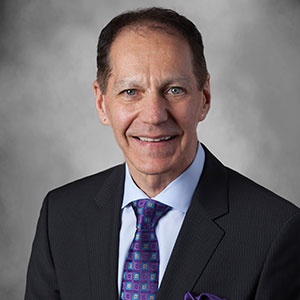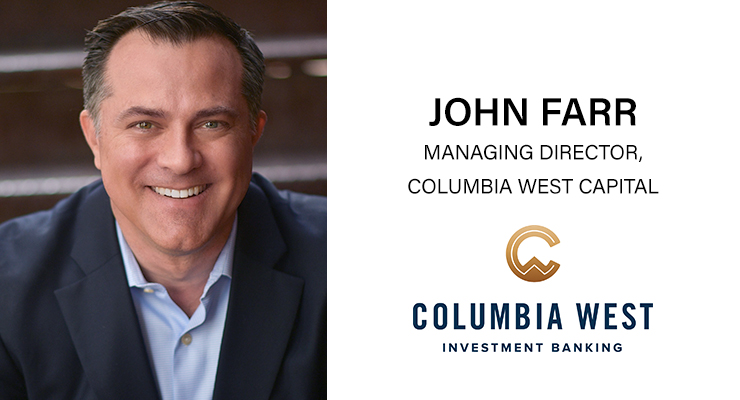Health E-Insights
What to Expect from Investment and M&A Activity in the Vitamin, Mineral, Supplement Industry
John Farr, Managing Director at Columbia West Capital, gives his assessment of the state of investment during challenging and uncertain times.

By: Sheldon Baker
CEO, Baker Dillon Group

John Farr serves as the managing partner for Arizona-based Columbia West Capital Health & Wellness group and is responsible for its development over the past seven years. During that time, he turned the firm into one of the top national investment banking brands serving the VMS industry. He has spent his career serving companies in the health and wellness, consumer, manufacturing, technology, and aerospace industries.
His transaction experience includes public and private companies such as Honeywell International, General Electric, Nutraceutical International, Nu Skin Enterprises, Boeing, General Dynamics, Kroger Inc., The Vanguard Group, and Atrium Innovations. He was previously with Honeywell Aerospace’s mergers and acquisitions team making acquisitions in the commercial and business aviation and defense markets.
Previously, he worked with PNC Equity Management, a one billion private equity group engaged in growth equity, leveraged buyout, and mezzanine loan investing primarily in consumer, manufacturing, and distribution businesses.
Farr began his investment banking career in New York where he worked as an analyst and associate with Deutsche Bank Alex. Brown. Farr earned a B.A. in Economics and Business Administration from Vanderbilt University and an MBA with concentrations in finance, accounting, and strategy from the Kellogg School of Management. Farr is registered with FINRA and has series 7, 24, 63, 79, and 99 securities licenses. He is a past recipient of the M&A Advisor’s national 40 Under 40 Award, is involved with several finance industry organizations, and is a frequent speaker on the topics of M&A, capital raising, and capital structure.
Health E-Insights (HEI): Did the pandemic affect investment opportunities and if so, is it still prevalent?
Farr: The pandemic drove consumer demand for VMS in 2020-2021, especially for anything immunity-related, and encouraged stockpiling due to supply chain fears. P&Ls accelerated, spurring healthy investment activity. More recently, P&Ls have fallen as demand has subsided, creating excessive earnings volatility that has made assessing valuation difficult.During COVID we saw a client triple in size and another cut in half, only to see both reverse direction a year later. Estimating recurring cash flow in this environment is difficult so buyers price conservatively, and potential transactions frequently fail to meet a seller’s higher valuation expectations. Indicative of investor concerns, a commonly repeated phrase today is “FOLD, Fear Of Looking Dumb.” Multiple investors have asked us “What did they do in 2019?” suggesting a desire to entirely disregard the last three years.
HEI: What is the current state of nutraceutical industry investment and are M&As showing robust activity?
Farr: M&A will continue, but 2022 volume is substantially lower than 2021, driven largely by VMS earnings declines. CW runs a tailored screen of private transactions for health and wellness companies. Our data found that M&A activity in that category soared during the first three quarters in 2021 as companies benefitted from skyrocketing demand, then dropped significantly in 2022.The dollar volume decline in a single quarter from 4Q21 to 1Q22 was a whopping 88%. Excluding the largest transactions, which commonly skew perception, the decline was still a substantial 68%. Unit volume declined 39% in that first quarter. In aggregate for the first three quarters in 2022, transaction count dropped 59% compared to the same period prior year, while dollar volume dropped 86%. Such a decline is historically significant albeit not surprising given 2021’s high watermark followed by a cautious 2022 market as buyers anticipated rate hikes, which eventually came beginning in March.
Valuations declined and due diligence scrutiny escalated to alleviate risk concerns. 2022 has also lacked the mega-transactions that characterized 2021, including Coca-Cola’s acquisition of BodyArmor Sports Nutrition ($5.6 billion) and Nestle’s brand acquisitions totaling $5.8 billion.
Despite the year’s challenges, recent M&A activity appeared to be trending upward beginning in Q322.
HEI: Has inflation changed the rules of financial engagement?
Farr: Inflation has—and in conjunction with rising rates and supply chain challenges—been the center of investor focus. Market corrections have greatly increased investor scrutiny, and private capital investment appetite is more subdued than 12 months ago. During prior market declines we all discussed inflation almost in a theoretical sense, but in this market it’s a tangible problem of significant magnitude, affecting many companies and resulting in material profitability swings. Labor, gas, transportation, and import costs have been the most volatile, but we have witnessed challenges broadly.HEI: Can you offer your professional insight about the financial road ahead.
Farr: Transactions will continue to get done for businesses without supply chain challenges and consistent customer demand. The largest strategic buyers including big CPG are well-capitalized and able to purchase middle market companies irrespective of their own subdued stock prices.Similarly, private equity capital is still abundant, and those investors are anxious to acquire businesses at reduced valuations. The question is: are owners willing to sell for less, or will they ride out the next two years and hope for a more robust environment? As in any market, companies with attractive revenue velocity will garner a premium irrespective of market sentiment.
Many companies providing hands-on or facilities-based services struggled at the onset of Covid and are doing quite well now. Those make great acquisitions today, but we do also anticipate more distressed M&A as some struggling owners capitulate. We project greater non-bank debt and structured equity transactions to pay off high interest debt now burdening companies. Floating senior products attractive in 2019 are now burdensome with their high rates and short terms, so we expect many owners will term it out into longer-dated private notes as soon as the CLO/CDO markets settle.
HEI: Any insights about the global nutraceutical market? Do you only work with U.S. companies?
Farr: The Wall Street Journal and Barron’s have both reported that Europe has struggled more than the U.S. and was in full recession at least a quarter earlier. We don’t believe that is consequential to VMS M&A specifically, given that the aggregators in this sector are global conglomerates with plenty of capital and are all witnessing the same market dynamics at play.As the industry has matured there are fewer regional differences within VMS M&A, and we expect both the U.S. and Europe to continue its footrace toward industry consolidation. We expect big activity to continue from Nestlé, which recently re-organized into operating zones to sharpen focus on targeted geographies.
The greatest global impact will be on raw materials. Supply chain woes and geopolitical concerns, particularly China, have spurred efforts to find alternative ingredient sourcing, so there will be winners and losers. At Columbia West, most of our clients are domestic, but we consider investors globally. We do anticipate less activity from Chinese investors in the near term, and European companies are always active in health and wellness, especially in gut health. If foreign investors and buyers comply with customary Western conventions regarding process running, structuring, and terms and conditions, we welcome them.
HEI: Do you personally focus on a specific business area?
Farr: We joke that we focus on the owner-operator “in-betweener” companies that have grown out of the mom-and-pop stage but still are not getting the attention of Wall Street. Investment banking is transactional (by definition), but we view our work as far more consultative. We serve as stewards of our clients’ goals and drive the transaction to ensure it meets their needs. That sounds corny, but most of our clients do not understand the best course of action while sitting across the table from billion-dollar acquirers. Columbia West levels that playing field. Relative to the large clients I served at Deutsche Bank, the owner-operators we serve here are less experienced with M&A and more emotionally invested. The human element is critical, so we serve the individual owners as well as the company. Unfortunately, that is unusual in our industry.HEI: What financial services does Columbia West offer nutraceutical industry companies?
Farr: At Columbia West our focus is exclusively on M&A and capital raising. For M&A that may include helping business owners sell their entire business or facilitating a partial sale whereby one partner exits while another remains. M&A may also include helping owners with add-on acquisitions.For capital raising, we work with owners to raise debt or equity in a manner that reduces their cost of capital and mitigates risk. In any engagement, our work entails the hard skills of materials creation, modeling, auction running, and negotiating and structuring transactions with investors. It also entails managing the human element, building partnerships, cultural matchmaking, and helping entrepreneurs get it right.
About the Author: Sheldon Baker is CEO of Baker Dillon Group LLC and has created numerous nutraceutical brand marketing communications and public relations campaigns for well-known supplement and food industry companies. For Health E-Insights interview consideration or brand marketing consulting, contact him at SBaker@BakerDillon.com.


